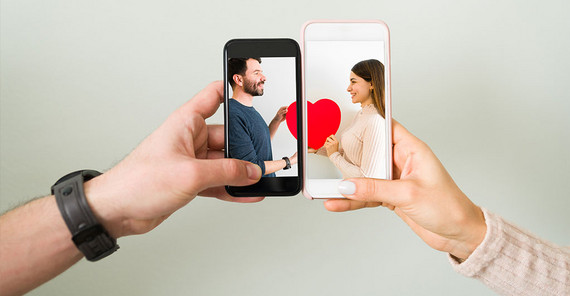At the beginning, there was a little experiment in her own partnership. “I noticed how much importance we attach to communication in the professional environment. People take part in communication and leadership courses, pay a lot of attention to how they talk to others and how to deal with their team. Actually, you could apply all this in a relationship, too,” Ms. Kraft, who was working at a company builder and as a coach at the time, thought. “A bit like a project manager, I then started doing monthly check-ins with my boyfriend. And that was really good,” she recalls, laughing. Similar methods could perhaps help other couples, she thought, and turned it into a business idea.
Relationship prophylaxis instead of relationship rehab
The plans have now turned into a first product: "LoveLane is the first game app for couples,” says founder Heike Kraft. Her goal is to inspire couples to do something for their relationship – and to do this in a playful way. “It should be fun and not feel like work,” she emphasizes. Carolyn Litzbarski is on board as a relationship expert and coach, having her own practice to help couples.
“Most couples only become active when it is already too late,” Ms. Litzbarski knows. When things start to go wrong, one partner usually suffers alone first. “The perception of the problem is not synchronous. There is often one person who sees the problem first. The other person has to be convinced that something should be done,” she explains. In the meantime, dissatisfaction can increase, communication suffers, and nerves are on edge. In the end, couple therapy seems to be the last resort, but it often also involves many hurdles.
“Many people are reluctant to do this at first. Couple therapy comes with a stigma: I’ve failed and need help from others,” Ms. Litzbarski explains. For those who make it into therapy, there is hard work ahead: “Couple therapy isn’t for people who want to do something good for themselves, but for people who need relationship rehab.” Ms. Litzbarski, like Heike Kraft, would like to prevent relationships from getting to that point in the first place and help couples take care of their relationship so that couple therapy becomes unnecessary. Prophylaxis instead of rehab is the motto.
Small effort, big impact
With LoveLane, the two send couples on a joint journey. “We have different islands with specific topics that offer different tasks and challenges,” Ms. Kraft explains the concept. On the first island, the users first get to know each other’s “love language” in a quiz. “What do I need to feel loved? That can be very different for everyone,” she explains. This concept was developed by the US couple and relationship counsellor Gary Chapman, who defined different “love languages”. While one of the partners needs touch and recognition as proof of love, it may be small gifts or things done together for the other.
“How we feel and interpret love is very individual,” Ms. Litzbarski says. When a couple speaks different love languages, this is similar to a foreign language: one does not understand the other. “This can quickly give rise to the subjective feeling: He or she doesn’t love me.” This partner does, in fact, show his or her love – but through his or her own means, which may not be understood as proof of love. Even the first few minutes with the app led to an “aha effect” for many users: They realize that their partner speaks a different love language. “When you know that, you can open up and then communication is possible again,” Ms. Litzbarski explains. “Speak your partner’s love language for a day,” is therefore also the first task for the couples.
Another island is about “sex fantasies” - to also “playfully share topics with each other that are often associated with inhibitions,” says the founder. According to the principle “it’s a match”, only what both partners like becomes visible to both afterwards. Step by step, the couples are guided through different stages of their relationship, are encouraged again and again to have small interactions and give little somethings: upload a photo that shows your facial expression when you miss your partner or what you are currently dreaming about. Give your partner a small gift. “This doesn’t take much time or effort but makes a big impact,” Ms. Kraft emphasizes.
Emotion-focused therapy forms the basis
LoveLane sounds playful, but it is actually based on a psychotherapeutic method: the so-called emotion-focused therapy. Closeness, connectedness, and affect are the focus of the method, which is especially popular in the USA and is successfully used in work with couples. “So far, mainly cognitive behavioral therapy has been used in couple therapy in Germany,” Ms. Litzbarski explains. “This is more about the level of thinking, communication, conversation and one’s own perception.” Emotion-focused therapy focuses on feeling. “It engages completely different areas of the brain and many studies show that this form of therapy is very successful.”
Before the team could develop their first pilot product and upload it to the app stores, they had to do a lot of research. In many user interviews, they determined the most common problems of couples and their triggers, when couples actively do something for their relationship and what the obstacles are. It quickly became clear: Women are more open to the topic than men. Ms. Litzbarski already knew this from her online relationship practice: “It’s mostly the women who come to me. They often have a very new relationship or face special challenges like patchwork constellations. Some are also dissatisfied with the communication in long-term relationships. For many, a sense of one-sidedness has set in.” So how can men be convinced to do something more active for their partnership? For this, the team tested landing pages, placed advertisements on social media, analyzed performance and functionalities, evaluated data and customer flows.
In the end, it became clear that it is all about approaching this difficult and complex topic with ease. “It is very important that the playful aspect is not neglected,” Ms. Kraft says. “The couples react very positively to our couple challenges,” she emphasizes. Now the aim is to consolidate the gamification of their product and, above all, to appeal to the positive feelings of the users. The fy plan to launch the second versionsoon. They are supported by their team, which includes a product expert, a game designer, a graphic designer, and several developers.
Nurturing a relationship is about more than an evening of watching Netflix together
LoveLane is aimed primarily at digitally savvy couples who are open to doing something for their relationship, parents who have little couple time, very young couples or couples living in long-distance relationships. “Many of our users already have experience with similar products such as apps for meditation or mindfulness,” explains the founder. “They understand relationships as part of their own further development. We observe this especially in young male users.” In the future, the team wants to focus even more on the scientific aspects of their product and test its effectiveness.
Do couples really have a noticeably and measurably better relationship with LoveLane by their side? How can this be quantified and how can the quality of a relationship be measured at all? Ms. Kraft is convinced that it is first necessary to create awareness around the need to nurture and promote love in a systematic way. “The market is still young. Couples are not used to doing anything for their relationship unless they go out for dinner or watch Netflix in the evening.” With LoveLane, she wants to show: It can be done differently: “It’s fun and improves the relationship.”
The Founders
Heike Kraft studied business administration at the European Business School in Oestrich-Winkel and is the founder of LoveLane.
Mail: heikeulovelanepco
Carolyn Litzbarski studied social work in Stuttgart and management in Munich. She has had arelationship practice since 2021 and joined LoveLane in 2022.
Mail: kontaktulitzbarski-coachingpde
The Project
LoveLane is a game app for couples who are curious about new inspirations to deepen their relationship.
www.lovelane.co
https://www.instagram.com/teamlovelane/
In May 2022, the team successfully obtained an EXIST grant, and they are now about to start their own company. Potsdam Transfer, the central scientific institution for start-ups, innovation, knowledge, and technology transfer at the University of Potsdam, also supports them. “We have a monthly exchange with Potsdam Transfer and the other EXIST teams, which is always very exciting: Where does everyone stand, what problems are there, what’s the feedback on the pitch, and who can connect whom and how? That’s very helpful,” Ms. Kraft explains. External partners from the business community regularly come to give expert input or point out funding opportunities from the federal government. Events such as the “Rooftop Pitch” organized by the Potsdam Science Park and the Economic Development Department of the state capital Potsdam connect start-ups with investors and provide important and necessary contacts during the start-up phase.
http://www.uni-potsdam.de/de/potsdam-transfer
This text was published in the university magazine Portal Wissen - Eins 2023 „Lernen“ (PDF).


